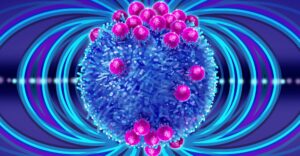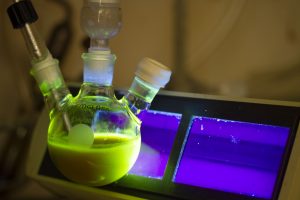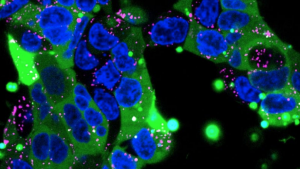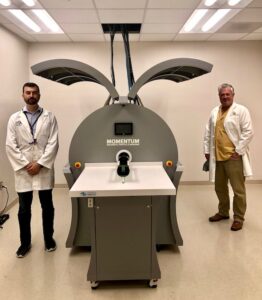
The INBT is pleased to participate for the sixth year with the Johns Hopkins community in the Vernon Rice Memorial Holiday Turkey Program, which supports the Baltimore community. For every $45 raised, a basket with a fresh turkey and vegetables from a local farm will be provided to a family in need. Learn more about Vernon Rice, the program, and how to donate. You can also read this story about the program by the Johns Hopkins Hub.
Donations for the Thanksgiving holiday are due November 8, 2023. If you donate, email Gina at ginawadas@jhu.edu so she can continue tracking how many meals we supported. So far, the INBT has provided 73 meals since the team has started participating.

Join the Institute for NanoBioTechnology in celebrating National Nanotechnology Day. We’ll have nano-focused bingo, nano building blocks, molding clay, snack-sized treats, and more. Come socialize with other INBT community members.
National Nanotechnology Day is an annual event featuring community-led events and activities on or around October 9 to help raise awareness of nanotechnology, its use in products that enrich our daily lives, and the challenges and opportunities for the future. This date, 10/9, pays homage to the nanometer scale, 10 –9 meters. Learn more about the National Nanotechnology Initiative’s Nanotechnology Day.
The theme for this year’s National Nanotechnology Day is “Enabling the Nanotechnology Revolution.” This phrase is inspired by the vision statement for the NNI which is to enable “a future in which the ability to understand and control matter at the nanoscale leads to ongoing revolutions in technology and industry that benefit society.” This year we are celebrating nanotechnology’s achievements over the past 20 years, as well as looking forward to how the NNI can continue to best support critical and emerging technologies of the future.

Ultra-low temperature freezers consume as much electricity annually as a typical single-family home. Hopkins laboratories can lower their lab’s carbon footprint and challenge your cold storage practices by taking part in the Freezer Challenge. Supported by the International Institute for Sustainable Laboratories (I2SL) and My Green Lab, this challenge is designed to promote best practices in cold storage management for laboratories around the world.
Johns Hopkins operates over 1,500 Ultra-low temperature freezers and even more refrigerators, standard freezers, and cold rooms that utilize millions of kWh per year. The annual challenge encourages labs to implement best practices related to cold storage maintenance, from temperature tuning (-70C is the new -80C) to removing ice buildup, that all contribute to making freezer more energy efficient.
The challenge runs through January 1, 2024 to June 30, 2024. To learn more about our other Green Labs initiatives at Johns Hopkins, please visit the Office of Sustainability website or email sustainability@jhu.edu. You can learn more about past Freezer Challenges at Johns Hopkins.

The Advances in Immunoengineering: Fundamentals and Cutting Edge Advances workshop is hosted by Johns Hopkins Translational Immunoengineering. The workshop meets twice a week for three weeks and participants are eligible for CME credit. The workshop is also offered as a one-credit course to Johns Hopkins students
The immunoengineering field is transforming cancer, autoimmunity, regeneration, and transplantation treatments by combining the diverse and complex fields of engineering and immunology. There is a significant need to train engineers in immunology and immunologists in quantitative engineering techniques. Moreover, there is a need to bridge basic immunological discoveries with advances in clinical application. This workshop features 12 speakers that will review immune system fundamentals and components, engineering strategies to modulate the immune system, and clinical applications.
After attending this workshop, the learner will demonstrate the ability to:
– Review the fundamentals and recent discoveries in the function of the immune system.
– Identify engineering strategies to manipulate the immune system.
– Describe the clinical applications of immunoengineering.
The full schedule, speakers, topics, and registration information are available on JH-TIE’s website.
Visualizing Immunity – Insights from Multiplex Dynamic and Static Tissue-scale Imaging
Presented by: Dr. Ronald Germain
Chief, Laboratory of Immune System Biology
Chief, Lymphocyte Biology Section
Director, Center for Advanced Tissue Imaging (CAT-I)
Abstract:
Immune responses involve cell interactions within lymphoid and peripheral tissues including tumors. To gain insight into the relationships between immune function and the local tissue environment, we have developed new multiplex 2D (IBEX) and 3D (Ce3D / Ce3D-IBEX) optical imaging pipelines and associated computational methods (RAPID and SPACE) for quantitative, spatially-resolved image analysis.
IBEX is an open-source method for iterative imaging used to probe fixed frozen or FFPE mouse and human tissues to as many as 80 parameters at ~ 300 nm lateral resolution. More than 1000 antibody conjugates have been validated for IBEX and a website provides details on these reagents. Ce3D (clearing enhanced 3D) is a fast-clearing technique giving excellent signal intensity from directly conjugated antibodies, permitting a high level of multiplexing and IBEX cycling.
Using these methods we have discovered novel commensal-dependent immune clusters at the junction of vagal sensory neurons in normal lungs. In cancers, these tools have revealed how immunotherapy converts suppressive Tregs into type 1 interferon-gamma producing effectors and the unanticipated negative effects of checkpoint therapy on stem-like memory T cells. A method for identifying T cells actively signaling through the antigen receptor has enabled us to identify antigen reactive cells in fixed tissue and to identify the cognate antigen presenting cell. Ce3D has been used to quantify antigen-specific cells in entire lymph nodes, revealing that suppression of autoreactive T cells by Tregs operates by promoting abortive proliferation.
These findings illustrate the power of in situ imaging for probing the molecular, cellular, and spatial aspects of immune responses in situ.
This work was supported by the Intramural Research Program of the NIAID, NIH.
Bio:
Ronald N. Germain received his M.D. and Ph.D. from Harvard University in 1976. Since then he has investigated basic immunobiology, first on the faculty at Harvard, then at NIAID, NIH. He has contributed to understanding MHC class II molecules, antigen processing, and T cell recognition, more recently pioneering analysis of the immune system using dynamic and static in situ microscopy. He has published more than 400 scholarly research papers and reviews and trained more than 80 fellows. Among other honors, he has been elected to the National Academy of Medicine, the National Academy of Sciences, EMBO, AAAS, the American Academy of Arts and Sciences, named a Distinguished Fellow by the American Association of Immunologists., and designated a Distinguished Investigator by NIH.
In-person Class Held in Hodson 210
Zoom Link: Passcode 530803: Meeting ID: 955 8366 7779
Open to any student-led team that has designed a health-related solution. All countries. All academic fields.
A competition to celebrate good design in healthcare. Winners show a solid understanding of the need, the people impacted, focused problem-solving, and a great real-world solution.
Timeline:
February 12 – Submission of two-page proposals
March 18 – Finalists informed
April 13 – Final round (virtual event)
Eligibility for Application:
Project must be focused on a healthcare application in either of the four tracksDesigns of Solutions for Advanced Health Systems
Global Health/ Humanitarian Design
Healthcare Apps/ Digital Health
Post-Surgical Infection Management
Project must have been started after January 1, 2022
Project must be driven by full-time studentsPostdoc research projects are ineligible.
Projects that have utilized significant funding (>$100K) are ineligible.
Projects that are not run by full-time students are ineligible. For example, projects run by startup companies or faculty are ineligible.
Eligible full-time students include those working towards undergraduate, masters, doctoral, and professional degrees (MBA, MD, etc.).Project teams should comprise of more than one full-time student.
Applicants can submit multiple unique projects

Join the community at the Whiting School of Engineering during the week of February 19 through 23 for Engineers Week, a national, annual celebration of the vital contributions that engineers make to the world.
Agenda
Aerospace and Aviation – Monday, February 19
WSE’s 14th Annual Speed Networking Night- Tuesday, February 20
Society of Women Engineer’s Tower of Power – Wednesday, February 21
Night at the Museum for WSE Graduate Students – Thursday, February 22
Career Fair – Friday, February 23

Scientists and engineers across many fields and disciplines are united by their work at the nanoscale. Their diverse efforts have helped produce everything from faster microchips to powerful mRNA vaccines. The transformative impact of this work has been spurred by the coordination and focus on U.S. nanotechnology established by the 21st Century Nanotechnology Research and Development Act in 2003. Celebrating such a broad impact and envisioning the future can be quite challenging, but this event will bring together voices from across the emerging technology landscape. There will be experts who can speak on the importance of nanotechnology in quantum engineering, optics, EHS, plastics, DEIA, microelectronics, medicine, education, manufacturing, and more. We can’t predict what will emerge from this lively discussion between researchers, policymakers, members of industry, educators, and the public, but the conversation can only benefit from including more diverse perspectives – especially yours.

The Johns Hopkins School of Medicine Department of Radiology and the KKI F.M. Kirby Research Center invite you to their first locoregional MPI Workshop, organized by Adnan Bibic and Jeff W.M. Bulte, where they will discuss the opportunities that Magnetic Particle Imaging (MPI) can provide for molecular, cellular, and functional imaging of biological processes in living organisms.
This event serves two purposes:
1. Introduction to MPI: They will provide an overview of the emerging MPI technology and what it can do that other non-invasive imaging modalities cannot.
2. Sharing Insights: Existing users will present their cutting-edge research findings, with the goal to foster new collaborations and generating new ideas. Interested people from other institutions in the Mid-Atlantic region have been invited to participate.
What is MPI?
MPI is an emerging non-invasive imaging technique that directly detects magnetic nanoparticles acting as a “cold” tracer imaging agent. Similar to “hot” radiotracers used in nuclear medicine, it is quantitative providing specific information without background signal. It is ultra-sensitive, currently used here in rodents, and in further clinical development elsewhere.
What to Expect
1. Research Showcases: Hear about the latest advancements in MPI research.
2. Networking Opportunities: Connect with the regional MPI community.
3. Q&A Session: Engage with experts and share your thoughts.
4. Hands-On Demos: Experience MPI firsthand through demonstrations.
Registration
Join in person or stream online. Register by March 8, 2024 to secure your in-person spot. They have a maximum of 40 participants. If you can’t make it in person, all registered participants will be able to stream in except for the hands-on demo. Contact adnan.bibic@jhmi.edu to register.
Location
Kennedy Krieger Inc.
707 N. Broadway, Room 510
Baltimore, MD 21218
The Johns Hopkins University Life Design Lab, the Carey Business School and FastForward U are partnering to bring Baltimore-region startups together with Johns Hopkins undergraduate and graduate students for this event!
Who: Undergraduate and graduate students from all years are encouraged to attend.
What: An opportunity to connect with startups and start building connections. All employers at this event will have some kind of opportunity for paid student engagement.
What to Do in Advance: Upload a resume to Handshake, research participating employers you would like to connect with, and practice your elevator pitch
When: April 3 from 4:30-6:30pm EST.
Where: Hosted at Fast Forward U: 320 W 29th Street, 2nd floor, Baltimore, MD 21211
Please note: Professional dress is encouraged for all attendees.


